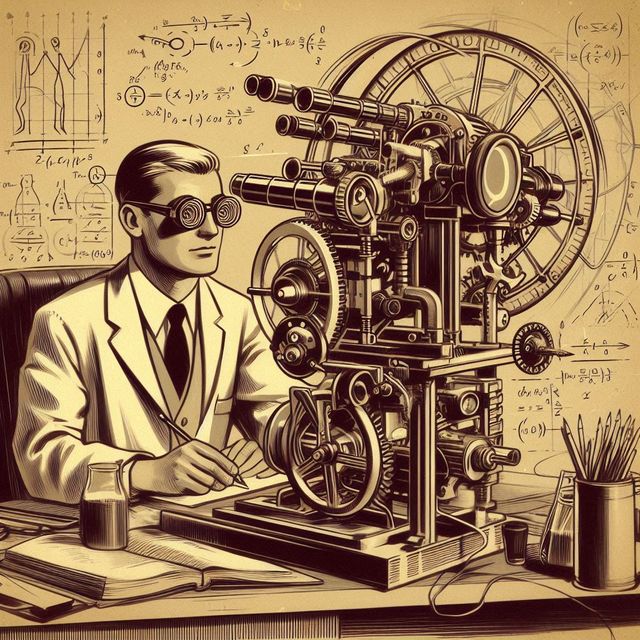-
Vijay Fafat
- Published on
Prof. Rumpel, a “genius touched by madness - a world sensation in the fields of mathematics, physics, astronomy - you name it”, considers matter and spacetime to be infinitely divisible. Just like there is no smallest positive number (“What is the smallest positive number? There isn’t any such thing, sir. Because if it existed, we could call it epsilon, say, and then epsilon divided by two would be smaller, so we have a contradiction.”), the eminent professor considers the phrase, “the ultimate particle” to be “the most illogical and indefensible phrase used in what is sometimes called the ‘Scientific World’. So of course, he goes and builds a machine which can zoom in and out of levels of reality and perception to explore the deep reaches below the atomic scale (Feynman would have been pleased). He takes a newbie reporter, Calvin Wilkins, on the journey. As the Prof. describes (with a hint of madness?):
“Suppose we could make a diminishing machine. This would be incomparably more important than the ‘time machine’ of science fiction, because we have at least some faint idea of what would happen if we could go backward or forward in time. True, our imaginations can likewise sweep outward, in a feeble way, through the endless galaxies of space; but in the other, or inward, direction, they haven’t made even a try. ·“Now let us suppose that we get inside the machine and then, when the fraction one over ten appears on a sensitive surface, we and the box shrink instantly to one tenth of our former dimensions. That means that the volumes would be reduced to one part in ten cubed. An alectric tape takes over, addling zero after zero to the denominator, and at each click we become one thousandth as large as before. In approximately ten clicks we become as small as the average atom, and in a few more we are in virgin territory, whose nature no one has even tried to guess. And after merely twenty-six clicks, as compared with normal man, we would be like that man standing before the universe of the radio telescope, assuming that universe to be some ten billion light years in diameter. All the time inside the box everything seems perfectly normal.”
So off they go, first stop of the “squeeze run” is “Station One Million and sixty three”, which is, I suppose, about 10^(-One Million and sixty three) meters scale. The professor carries “condensed air” to breathe, they gambol around in pre-quantum foam (for the Planck scale and Wheeler’s quantum foam have long been left behind in the dust) which resembles some hole-filled topology with imagined colors. On their further journey to “Station Three Billion”, they find “charming creatures who hands with six fingers and no thumbs, and so, use base 12 arithmetic on their signboards.
At “Station Three Billion”, the reporter - wait for it - finds true love… As he describes,
“Oh, what a beautiful world, this one! Trees and grass and wind, almost like on earth, but better. And there, walking past with a grace no woman on our planet could ever match, was a creature who was like an incredibly lovely human reared in another age, and utterly purged of all earthly flaws.”, She speaks English, naturally, and to the credit of the reporter, he does wonder how this is possible. He guesses that “in the billions upon billions of chances, couldn’t it just happen that you might run across near repetitions, even in the matter of language? Wildly improbable, of course, but…“.
The truth is revealed in the end but we won’t go into that here. You should read Calvin’s love poem and final adventure in the story.
